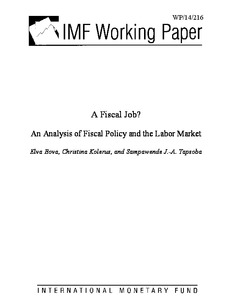A fiscal job? An analysis of fiscal policy and the labor market
"This paper examines the impact of fiscal policy on employment through the lenses of Okun’s Law. Looking at the panel of OECD countries over the past three decades, we find that fiscal policy can affect employment beyond the impact it is traditionally assumed to exert through the output multipl...
| Main Authors: | , , |
|---|---|
| Institution: | ETUI-European Trade Union Institute |
| Format: | TEXT |
| Language: | English |
| Published: |
Washington, DC
2014
IMF |
| Subjects: | |
| Online Access: | https://www.labourline.org/KENTIKA-19115408124919336809-a-fiscal-job?-an-analysis-of-f.htm |
| Summary: | "This paper examines the impact of fiscal policy on employment through the lenses of Okun’s Law. Looking at the panel of OECD countries over the past three decades, we find that fiscal policy can affect employment beyond the impact it is traditionally assumed to exert through the output multiplier. In particular, this impact is found to be effective for most items of current discretionary expenditure and for corporate income taxes and social security contributions. Okun’s Law is found to be stable under almost all model specifications, but higher spending on subsidies and lower social security contributions can amplify the impact of the output gap on employment gaps." |
|---|---|
| Physical Description: | 26 p. Digital |

